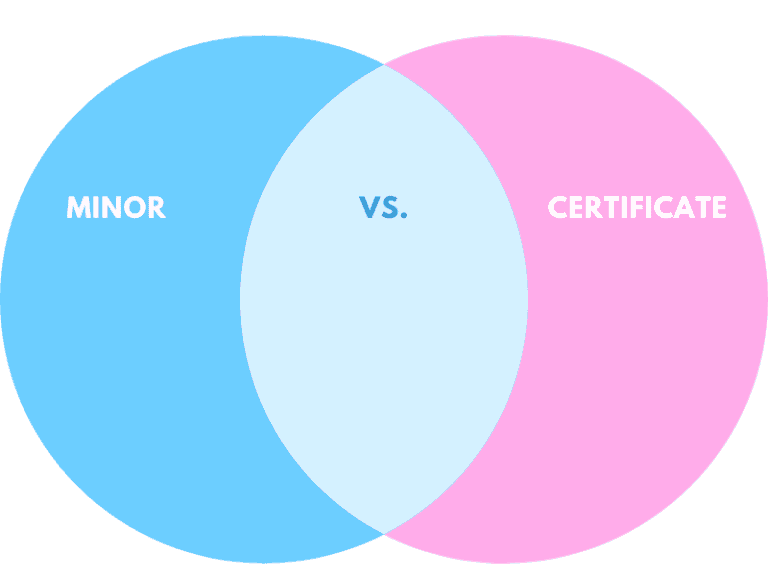Do College Minors Matter?
Undergraduate students can earn a college degree even without having a minor. In fact, some institutions do not have minors.
Here’s one example to consider: Brown University, which is an Ivy League school in Providence, Rhode Island.
While majors usually take 30 to 36 credits to earn, minors typically take 18 to 30 credits to complete.
Still, it can work to the advantage of undergraduates.
College minors allow them to gain additional knowledge and skills, which is why those that complement majors can help boost job market value and earning potential, too, although one should avoid having 3 or more minors at once — the general consensus is that having 1 to 2 college minors is optimal.
Some of the most popular minors include accounting, business, creative writing, data science and statistics.
However, it’s important to note that it will depend on a student’s major and interests.
Are College Minors Worth It?
Minoring in college is worth it for students who wish to gain knowledge on a secondary subject matter, usually related to their major.
Getting a minor is also worth it for students who wish to explore a particular interest or passion in life, which can be used as a basis for deciding on a minor.
It’s true that the Common App asks which minor you want to declare and later on commit to.
However, it doesn’t mean that you should stick to it until the time your chosen college or university hands you your diploma.
Most of the time, you have to decide until the end of your sophomore year of college or the beginning of your junior year of college.
The Common App’s website itself says that you can always make changes after submitting your application, so there is no need to choose a minor to slow down the application process.
You can consider a minor as a mini-major — like a major, a minor consists of a group of classes around a particular discipline.
A major usually has around 12 classes you need to attend for completion. On the other hand, the number of classes to complete your minor is just 6 classes or less.
Unlike a major that has something to do with a degree program, a minor does not have be related to a major.
You can, in fact, declare a minor based on a hobby or interest of yours, such as ancient history, cooking, or designing.
It can work to your advantage after graduation, as potential employers will see that you have a passion as well as the desire and determination to pursue it while completing a major.
But then you can also pick a minor according to your chosen major. Most students opt for one that complements their major, thus enabling them to gain in-depth knowledge about something that’s closely related to it.
Related Post: 15 Good College Minors: Which One is Best for You?
Do Employers Care About College Minors?
Some employers care about minors, while others don’t. The value of minors during job applications depends on the industry and the opinion of hiring managers.
Employers who care about minors prefer applicants whose minors are related to their majors and/or the job positions they are applying for.
The presence of a minor on your resume and transcript can speak many positive things about you.

Completing a minor that supports your major, as the majority of college students do, may translate to wanting to ensure you have a solid knowledge base of your chosen degree program.
It may also show that you know what you want precisely, which is why, for example, you are a Business major with a minor in Economics or Accounting.
Opting for a minor that complements your major can help boost your job market value. Nothing can make an employer have peace of mind more than knowing that the person who just got hired knows what he or she is doing.
However, in some cases, having a minor that has something to do with your personal interest is better.
Some employers out there are on the hunt for well-rounded and passionate people.
Keep in mind that some colleges and universities do not allow their students to have more than one minor.
Can College Minors Help With Finding Jobs?
Having a minor can help job applicants stand out from the rest. It demonstrates additional knowledge associated with one’s major or passion in life.
However, there is such a thing as too many minors. Having multiple minors can do more harm than good for some employers and in some industries.
According to a news release by the US Bureau of Labor Statistics (BLS), the number of people who are not in the labor force and currently want a job amounts to 6.4 million.
You will become one of the millions who want to get employed after graduating from college.
Needless to say, you will have to compete with a lot of job seekers, many of which are qualified for the posts they are after. This is when the benefit of minoring in something in college comes in, as it can make you more noticeable to employers than the rest.
In some instances, employers state outright what they want in their employees.
And if you possess the qualities they are looking for exactly because of a minor you took, then you already have the edge you need to get hired.
When it comes to minoring, having more minors doesn’t necessarily mean a more impressive resume.
Some employers may favor applicants with just a single minor over those with multiple ones.
Successfully completing a lot of minors may show that you can multitask alright.
However, it may also exhibit fickle-mindedness. What employer would hire someone who couldn’t make up his or her mind in college?
Besides keeping some potential employers from raising an eyebrow, sticking to one or two minors can also keep you from spending more money and devoting more time to school.
It can also save you from getting low grades — having several minors entails more classes, assignments, projects, and exams.
There’s a reason why the majority of colleges and universities do not allow their students to have two minors.
Are Minors Better Than Majors?
A major is a primary specialization. A minor is the second one that is often considered a mini-major.
Because of this, it doesn’t come as a surprise why students decide on a major first and pick out a minor second. This is especially true if the reason for declaring a minor is to complement one’s chosen major.
Refrain from feeling pressured to pick a major without delay because it can wait.
At most colleges and universities, students have to declare a major by the end of their sophomore year of college or before their junior year of college starts.
More often than not, a minor is declared at the same time as a major. Even if it’s not required by your school for you to have a minor, consider completing one to take advantage of the opportunity.
Most students feel stressed and anxious when it’s time for them to choose a major. That’s because they know that whatever they declare, they will have to commit to until they finish college.
The good news is that you can choose to switch to a different major, which is a practice that’s not uncommon.
As a matter of fact, roughly 80% of college students change their major at least once.
So, yes, you can hop from major to major, but it’s not the most time- and money-saving way to get your hands on a bachelor’s degree.
If you wish to change your major, see that you will enjoy the replacement to keep yourself from looking for another major to opt for sooner or later.
Keep in mind that some colleges and universities do not allow their students to change their declared majors.
Is a Double Minor Better Than a Double Major?
Despite what many believe, a double major allows a student to earn a single bachelor’s degree. It is an entirely different thing from a double or dual degree.
While a double major takes a while to complete, a double minor, with careful planning, does not require a student to add a semester or two.
Time-wise, a double minor is better than a double major. Generally speaking, a major is made up of 12 classes. Each class is equivalent to about three credit hours.

Needless to say, having two majors at once essentially requires you to take 24 classes. It’s for this reason why double major students usually graduate about a year later.
And because a double major entails completing more classes, it doesn’t come as a surprise why having a double major cost more than having just a single major. It also costs significantly more than going for a double minor.
Besides the tuition and fees, many other things can cause a double minoring’s overall cost to reach sky-high.
Due to the need to attend more classes and stay longer in school, the amount of cash you have to shell out for textbooks, school supplies, housing, food, transportation, and others can easily pile on top of each other!
Refrain from assuming that having multiple minors, on the other hand, is all pros and no cons.
Some employers find the resumes and transcripts of applicants off-putting if there are lots of college minors printed on them.
They assume that these applicants have a hard time making up their minds and/or have no idea of what they really want, which may not make them some of the best additions to the workplace.
When deciding whether or not you should choose and commit to multiple minors, ensure that you consider your budget, college timetable and career goals.
More importantly, take your time when making a choice — you have the first two years of college to think about it and the last two years of college to complete it successfully.
Do All Colleges Offer Minors?
The majority of colleges and universities offer minors. However, not all of them require students to declare and complete minors.
So, in other words, depending on the school, a bachelor’s degree can be earned without a minor.
On the other hand, it’s impossible to earn a bachelor’s degree without a major.
If the college or university you are attending expects its students to have a minor, declare and commit to one (or two) that you feel can help increase your job market value or let you pursue a hobby or interest.
If completing a minor is mandatory at your school, then it’s completely up to you whether you will declare one or not.
Having a minor, even if it’s not mandatory, can work to your advantage.
Successfully completing a minor gives you in-depth knowledge of a subject matter, which you can use as leverage to turn the dream job of your wildest dreams into a reality.
Refrain from assuming that minoring is all about increasing your job marketability and paycheck. When choosing a minor, it’s not just what you want to be after graduation that you can consider.
You can also take into account your passion.
Music, culinary arts, travel and tourism, costume design, archaeology, law — every interest has a minor!
Note that it’s possible to graduate in four years, even if you have a double minor.
Having a double major, in contrast, will usually require you to stay in school for another term or two.
Do Minors Show Up on a Diploma?
Earned minors, more often than not, do not appear on a diploma.
As a matter of fact, completed majors do not show up on a diploma either.
What appears on a diploma is the degree earned. An institutional honors designation also appears. Completed minors and majors show up on the transcript instead.
Some people do not go to college because they can’t afford the steep sticker prices. On the other hand, some people do not remain in college because they can’t keep their grades up.
Due to this, it’s a good idea to grab every opportunity to increase your knowledge base if you are one of the lucky people on the planet to be able to go to or stay in college.
Even though some colleges and universities do not require their students to declare and complete a minor in order to graduate, having one is a wonderful way to maximize your college life.
Because earning a degree isn’t cheap and most degree programs aren’t easy, you just want to scream at the top of your lungs that you are minoring and intend to complete it or have already finished it.
Sadly, not all people will know about your minor unless they ask you or brag about it even before someone gets the chance to ask.
A potential employer will only know that you have completed a minor when he or she asks you to talk about it or checks out your resume or transcript — yes, minors and majors, too, appear on the transcript but rarely on a diploma.
However, some colleges and universities do include the minors completed by their students on their diplomas.
For instance, at the University of California – Davis (UC Davis), a public land-grant research university considered as a Public Ivy, completed minors are listed on both the transcript and diploma they issue.
Is It Good to Minor in Something
Students can gain additional in-depth knowledge or pursue their hobbies and interests by choosing the right minors. On the other hand, employers can benefit from hiring applicants whose minors can work to the business or company’s advantage.
Whether to minor in something or not depends on your career goals and the kind of academic experience you want.
In some instances, having a minor is required by a college or university for a student to graduate. Other times, completing a minor is completely optional.
Before you decide to declare or not declare a minor, make sure that you check your school’s requirements.
Also, weigh the pros and cons of completing a minor, whether as a complement to your major or in pursuit of your passion.
Disclaimer: The views and opinions expressed in this article are those of the authors and do not necessarily represent those of the College Reality Check.





